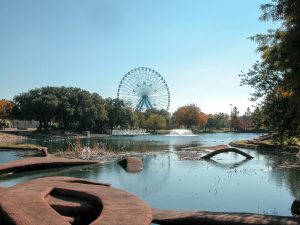
Betty Culbreath has spent her entire life in Dallas, and quite a few years of it serving on different boards within the City of Dallas. She knows all the players in city government, and at least the names of the bigger players on the business end as well. She has no particular quarrels with any of them, but is keeping a close eye on the happenings around Fair Park, which she sees as the center point in a battle that is responsible for much of the money flowing into local elections.
“It’s two white men fighting over Fair Park,” Culbreath said, adding that the Fair Park issue had been long ignored even by the people living close to it. Her loyalty is with the residents in the area, but their impact is limited as Culbreath points out that other than a few pockets within the neighborhoods, most of the residents in the area are renters.
She sees special interest groups like the For Our Community Political Action Committee (PAC) as just a part of that ongoing battle, but a very well-financed part.
“Obviously people are going to support the people who are pushing their agenda,” Culbreath said.
She has seen that pattern happening over and over again, but with today’s PAC-driven political landscape, the money has gotten bigger.
Heading toward the 2014 midterm elections, the Supreme Court ruled in McCutcheon v. Federal Election Commission that limits put on the amount that corporations and unions could contribute to political campaigns were unconstitutional.
“The government has a strong interest, no less critical to our democratic system, in combating corruption and its appearance,” Chief Justice John Roberts wrote in support of the court’s opinion. “We have, however, held that this interest must be limited to a specific kind of corruption — quid pro quo corruption — in order to ensure that the government’s efforts do not have the effect of restricting the First Amendment right of citizens to choose who shall govern them.”
That followed the Citizens United vs. Federal Election Commission decision in 2010, which asserted that “freedom of speech” overruled earlier limitations on campaign spending by non-profits, for-profit corporations, labor unions and other associations.
After that decision, President Barack Obama could foresee problems in the future.
“With all due deference to separation of powers, last week the Supreme Court reversed a century of law that I believe will open the floodgates for special interests — including foreign corporations — to spend without limit in our elections,” Obama said when the issue was still fresh in the headlines.
Culbreath has seen a lot of North Dallas support for candidates running in South Dallas elections in the past, but under today’s rules, the numbers just seem to be getting higher and higher.
“It just seems now that there’s a way for rich people to give large amounts of money to candidate without any transparency,” Culbreath said.
The issue is hot in Dallas these days after the PAC known as “For Our Community” has pumped more than a quarter million dollars into local city council campaigns.
Two of the more heavily financed campaigns the For Our Community PAC has invested in are South Dallas districts with large African-American populations. South Dallas has been heavy on the radar of the current mayor and council, with growth and several key projects, like the future of Fair Park, on the drawing boards.
Councilmembers Tiffinni A. Young and Erik Wilson are facing stiff competition in the city council race. Both incumbents have emerged from a highly competitive first round of voting with spots in runoff races for their seats. Both were assisted in their efforts by the For Our Community PAC. This has raised concerns throughout the South Dallas black community.
“What is sad is there are Black people who know that it’s about the money and Fair Park but they are going along with the Sell Out of their people and district,” Culbreath expressed in a frustrated post on Facebook.





Comments are closed.